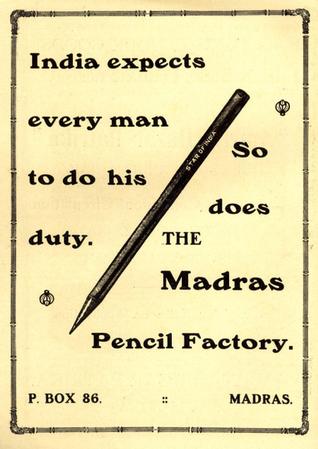“Make in India” may be the buzz now, but there was a time when ‘to make in Madras’ meant fighting vested interests. The accompanying advertisement may bring old memories — of pencils such as Kohinoor, Ajantha and Spectrum, all sold by V. Perumal Chetty & Sons, and manufactured at their Madras Pencil Factory. That factory closed in the 1990s, but it had a history that stretched to a time when ‘make in Madras’ was considered possible.
It was sometime in 1899 that the Madras government got Alfred Chatterton, of the College of Engineering, to study the potential to set up industries. He did pioneering work in this area, first demonstrating that aluminium could be used in place of brass and copper to make vessels. That effort led to the Indian Aluminium Company (INDAL). The established business houses of Madras, all British-owned, were not happy with this. They were comfortable exporting raw materials to Britain and importing finished goods. Local industrial development they felt would mean Indians would take to it, thereby threatening them with competition.
But Chatterton was undeterred. In 1908, he convinced the Government of Madras to set up a Department of Industries, a first for the entire country. The Swadesi movement led by patriots such as V.O. Chidambaram Pillai was gaining ground then. Chatterton openly sided with the Swadesi Movement, declaring it “a good sign for India to develop her industrial life” and “Madras to rid itself of its character of an overstocked market of literacy employment”. His colleague Frederick Nicholson went a step further, stating that in the matter of Indian industries, “we are bound to consider Indian interests — firstly, secondly and thirdly — I mean by firstly, that local raw products should be utilised; by secondly that industries should be introduced and by thirdly, the profits of such industry should remain in the country.”
Both Chatterton and Nicholson felt that the government would need to set up small industries, which could then be sold to Indians to run. Nicholson established the Fisheries Department and created the Lalita Soap Works in Madras. Chatterton founded the Government (later Madras) Pencil Factory at Korukkupet. He imported wood from East Africa for the pencils and ran advertisements with a strong nationalist slant as you can see, to drum up business.
The business houses of Madras lobbied hard through the Madras Chamber of Commerce and got the Department of Industries closed in 1910. It was only after repeated protests by Indians in the Madras Legislative Council that it was reinstated in 1914. Its resurrection was celebrated with a Madras Industries Exhibition organised by the Department.
The Government operated the pencil factory till 1918 and then put it up for sale. A syndicate of Komati Chettys of Madras, led by the Perumal Chetty clan, bought it and the rest is history. Chatterton and Nicholson were knighted, which is not the kind of reward that civil servants would get today if they went against the establishment for the sake of public interest.
source: http://www.thehindu.com / The Hindu / Home> Features> MetroPlus> Society / by Sriram V / Chennai – November 16th, 2014
